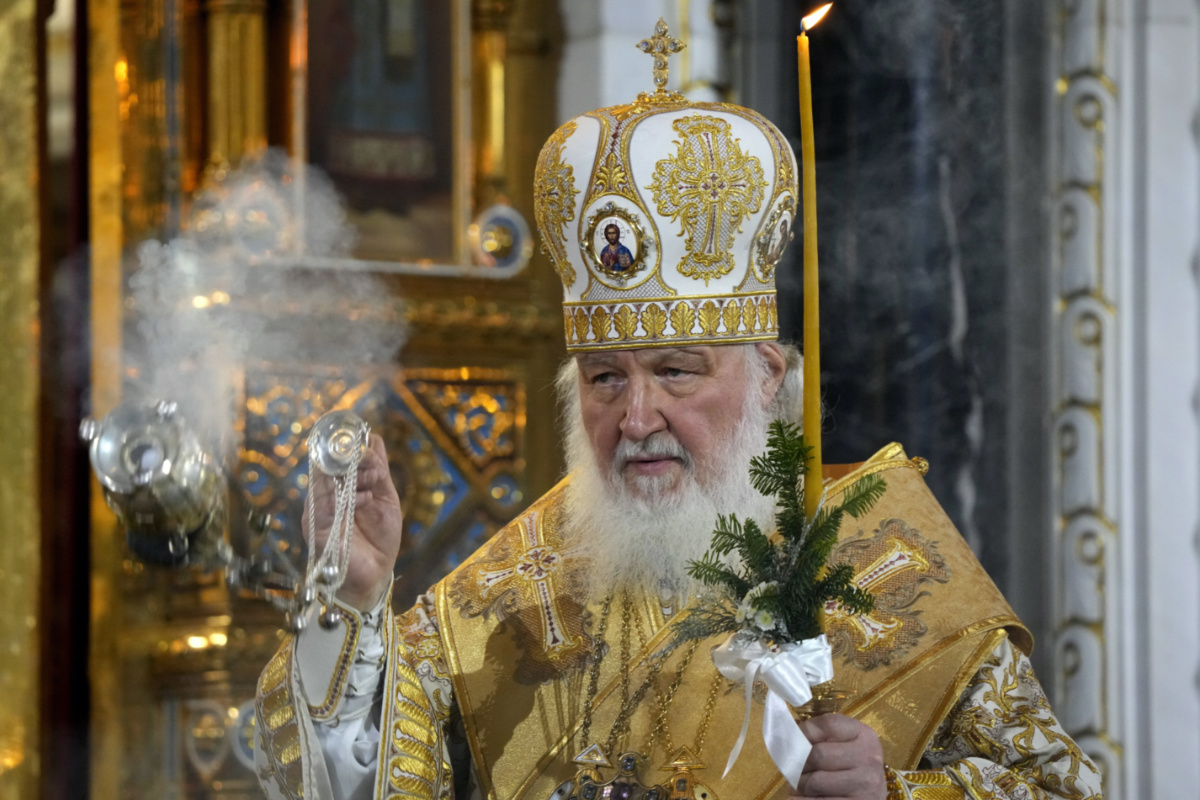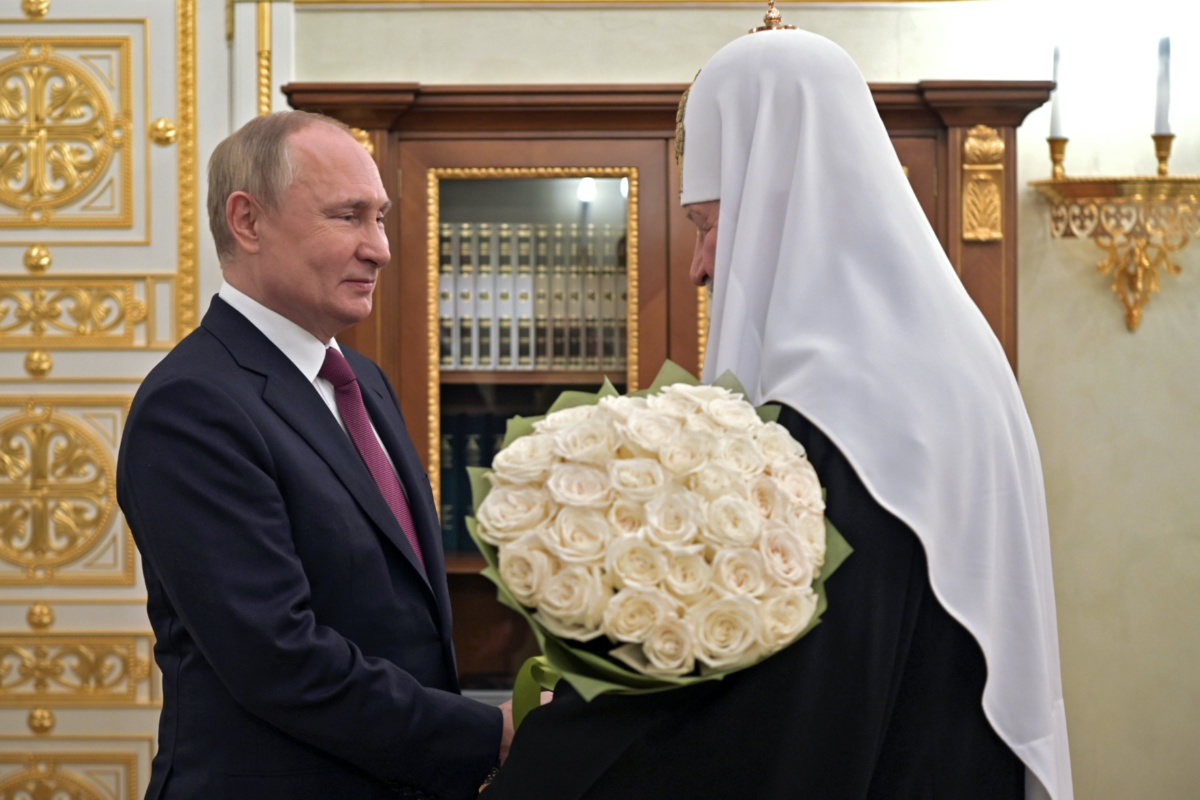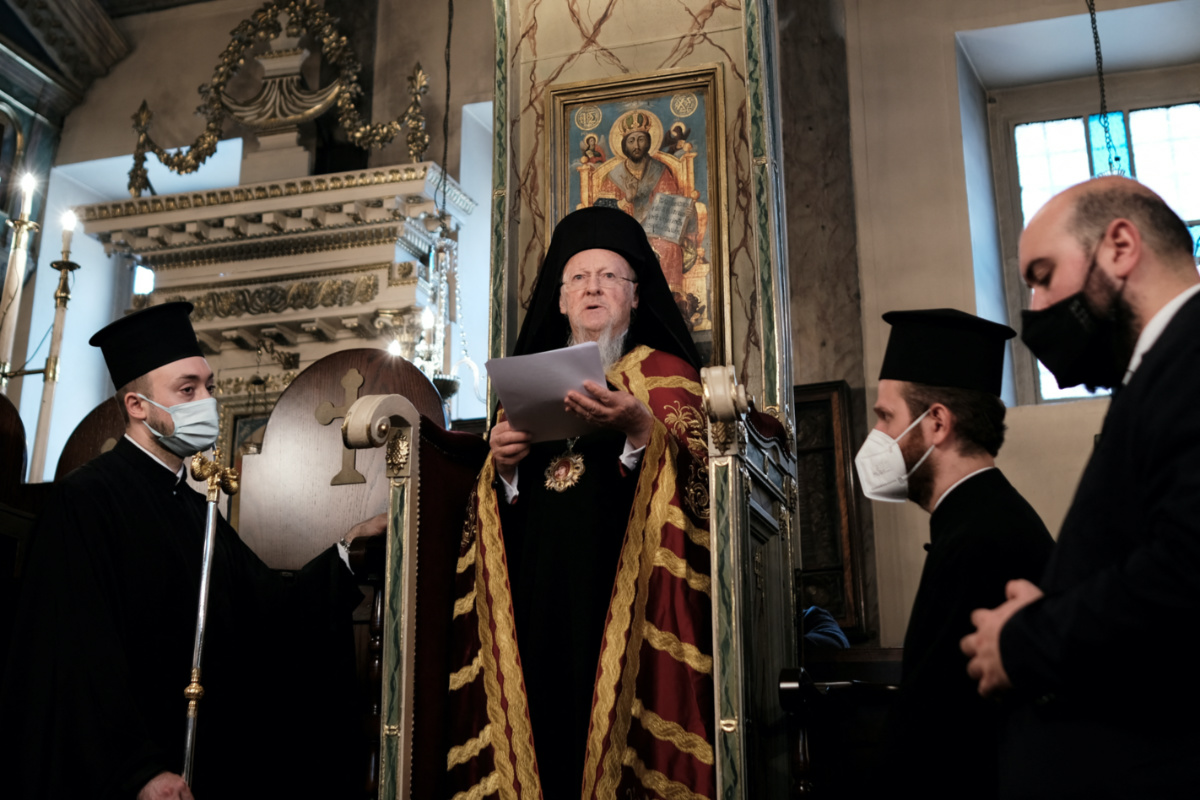
PETER SMITH, of Associated Press, reports on the role religion – in particular the schism within Eastern Orthodoxy – is playing in the conflict in Ukraine…
While Russia has sought to justify its assault on Ukraine with complaints about NATO’s eastward expansion, it has also claimed that foreign actors have encroached on its religious turf in Ukraine – even alleging the United States helped instigate an Eastern Orthodox schism there.
Moscow Patriarch Kirill, head of the Russian Orthodox Church, said both the West and a rival patriarch were “pursuing the same end” of seeking to weaken Russia and “make the brotherly peoples – Russians and Ukrainians – enemies”.

Russian Orthodox Patriarch Kirill delivers the Christmas Mass in the Christ the Saviour Cathedral in Moscow, Russia, on Thursday, 6th January. PICTURE: AP Photo/Alexander Zemlianichenko, File photo.
While hardly the only factor in the war, the religious grievance shouldn’t be overlooked, experts say.
“You cannot call it a religious war, but it has a religious dimension,” said Rev Cyril Hovorun, an Orthodox priest, native of Ukraine and professor of ecclesiology, international relations and ecumenism at University College Stockholm.
“You cannot call it a religious war, but it has a religious dimension.”
– Rev Cyril Hovorun, an Orthodox priest, native of Ukraine and professor of ecclesiology, international relations and ecumenism at University College Stockholm.
Kirill made his comments in reply to a letter from the acting head of the World Council of Churches, who had called on him to “raise up your voice” and mediate with authorities to stop the war in Ukraine.
Kirill replied that the war wasn’t the fault of Russian authorities. Instead, he claimed the seeds of the conflict were sown by foreign threats to its borders, both political and religious.
He cited the Ecumenical Patriarch of Constantinople, who in 2019 formally recognised the independence of the Orthodox Church of Ukraine – in a country where the Moscow Patriarchate claims jurisdiction. The Ecumenical Patriarch, based in Turkey, is considered “first among equals” among Orthodox patriarchs but, unlike a pope, doesn’t have authority beyond his own territory.
In January, Russian Foreign Minister Sergey Lavrov accused the US of being “directly involved in the ongoing crisis in Orthodoxy” and of having “financed Patriarch Bartholomew of Constantinople so he could pursue a policy of divide, including in Ukraine”.
He didn’t offer evidence of such alleged manipulation, though US officials spoke in support of Ukrainians’ right to religious self-determination.
The majority of Russians and Ukrainians are Orthodox, but the controversy goes deeper than numbers.
Patriarch Kirill is a longtime supporter of Russian President Vladimir Putin. Both have promoted the concept of a “Russian world”, forged in a millennium of shared Orthodox Christian culture in Russia, Ukraine and Belarus.
Ukrainians have asserted that they’re a separate people, though related to Russians. But in the run-up to the war, Putin belittled modern Ukraine as an illegitimate Soviet invention. He alleged that Ukrainian Orthodox who remained loyal to Moscow were under threat.

Russian President Vladimir Putin congratulates Russian Orthodox Church Patriarch Kirill on the 13th anniversary of his enthronement in Moscow, Russia, on Tuesday, 1st February. PICTURE: Alexei Nikolsky, Sputnik, Kremlin Pool Photo via AP/File photo.
The Russian-world concept forms some of the backdrop to Kirill’s first major wartime sermon, on 6th March. He claimed there was a “metaphysical” struggle at stake in Ukraine. He depicted it as a struggle against a foreign liberal establishment purportedly demanding countries hold “gay parades” as the price of admission to a world of excess consumption and freedom.
Whether such claims by Russian leaders “have credibility or not in the eyes of the world is not of primary importance,” said Catherine Wanner, a Pennsylvania State University professor of history, anthropology and religious studies whose research focuses on the region. “The audience is their own people, the Russian people.”
The disputes over the church have roots in Orthodoxy’s arrival to the region a millennium ago.
In its early centuries, the Kyiv-area Orthodox were under the Ecumenical Patriarchate. But in 1686, with Constantinople’s church weakened under Ottoman rule, the ecumenical patriarch delegated to the now-independent patriarch of Moscow the authority to ordain the metropolitan, or top bishop, of Kyiv.
The Russian Orthodox Church says that was a permanent transfer. The Ecumenical Patriarchate says it was temporary.
Hovorun said modern church history belies the Russian claims that the independent Orthodox Church of Ukraine is a US project.
“The idea of an independent church is almost 100-years-old” in Ukraine, Hovorun said.
We rely on our readers to fund Sight's work - become a financial supporter today!
For more information, head to our Subscriber's page.
Independent-minded Ukrainian Orthodox organised during Ukraine’s brief independence in the 1920s and again after post-Soviet independence in the 1990s. The two main breakaway churches merged and received long-sought legitimacy when Ecumenical Patriarch Bartholomew recognized the Orthodox Church of Ukraine in 2019. Moscow fiercely protested the move.
“Until that step was taken, Kirill and everyone else could always refer to the various Ukrainian churches as schismatic,” Wanner said. “That was the moment in recent history where then the rivalry over the authority of the Moscow Patriarchate and the Ecumenical Patriarchate came to a head.”
Politics did play a role in the new church’s establishment, Hovorun said, but it “was a response to the politicisation of the Russian church by the Kremlin.”
After Russia seized Crimea in 2014 and began supporting separatists in eastern Ukraine, then-Ukrainian President Petro Poroshenko advocated for recognition of the breakaway church, calling it the “final independence from Russia.”
The US State Department did issue statements of congratulations on the establishment of the independent Orthodox Church of Ukraine. That, plus ongoing dealings with Ecumenical Patriarch Bartholomew, who has met with top US dignitaries, has fueled Russian allegations of a US role in the schism.
But Sam Brownback, who at the time was the US State Department’s ambassador-at-large for international religious freedom, said the US was supporting Ukrainian self-determination.
“We did have Ukrainian church members and Ukrainian Government officials come in and say, ‘We want to establish our own…church,’” he said in an interview. “We said, ‘That’s good by us, we believe in your own autonomy to structure as you see fit.’ But it’s a church decision, it’s not a decision made by the United States government. We don’t tell the College of Cardinals what pope to pick.”

Ecumenical Patriarch Bartholomew I, the spiritual head of some 300 million Orthodox Christians worldwide and based in Istanbul, speaks following a Sunday service at the Agios Charalampos Greek Orthodox Church in Istanbul, Turkey, on 27th February. PICTURE: Reuters/Murad Sezer
The establishment of a new church was a signature accomplishment of Poroshenko, Wanner said. “Having said that, he was resoundingly voted out of office, and in came a secular Jew [current President Volodymyr Zelenskiy] who promised not to meddle in religious affairs,” she said.
Moreover, many Ukrainian Orthodox remained in the branch that is loyal to the Moscow Patriarchate. But that loyalty is now breaking down, with many clergy ceasing prayers for Kirill in their public worship in response to his failure to condemn the Russian invasion.
A top representative of Patriarch Bartholomew in the United States denounced Kirill’s statements.
“Unfortunately, calls for peace from Patriarch Kirill ring hollow when he blesses the invasion of a sovereign nation in the name of an imperialistic notion of ‘Russian World’ that is long dead,'” Archbishop Elpidophoros of Greek Orthodox Archdiocese of America said in a statement.
He added that Bartholomew “granted a way forward to the Ukrainian Orthodox that was based in freedom, and we pray that when peace again reigns in their land, they will freely choose their own path forward.”





